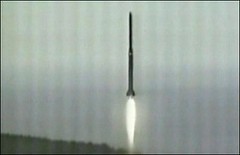
Rocket launch from the DPRK took place on April 5, 2009. The US condemned the launch but the UN Security Council did not issue a position.
Originally uploaded by Pan-African News Wire File Photos
By Deirdre Griswold
Published Apr 12, 2009 5:27 PM
On April 5, the Democratic People’s Republic of Korea announced it had launched a communications satellite into orbit. It was a remarkable first for this small socialist country in the north of Korea, which has been struggling to develop a modern economy in the face of great hostility from Washington.
U.S. troops have occupied southern Korea ever since the closing days of World War II, when revolutionary forces were liberating the north from Japanese colonial rule. Washington’s occupation and control over the south led to the division of Korea, followed by a bloody war in 1950-53.
The launch of the Kwangmyongsong-2 satellite, announced in advance by the DPRK, provoked consternation among official circles in the U.S. and Japan. Both imperialist countries had sent an armada of warships to the sea east of Korea to monitor the event and menace the DPRK.
Japan had threatened to shoot down the rocket carrying the satellite if any debris from the launch entered Japanese airspace—a threat not taken seriously, since failure could prove an embarrassment and so-called “missile defense” systems are notoriously unreliable.
U.S. President Barack Obama, speaking the same day as the launch to a rally in the Czech Republic, called it “a provocation” and called for strong action against the DPRK in the U.N. Security Council.
It was an ironic locale for Obama’s speech. The Czech regime, which has been trying to foist a U.S. military base on the people there, had just postponed a vote in parliament on the measure when it became clear that it would not pass. Polls show a large majority of the Czech people are against the base.
The Republican right attacked Obama for not being tougher. Former House speaker Newt Gingrich said he should have ordered “preemptive action” to stop the launch.
For weeks, the U.S. corporate media had been condemning the DPRK for the expected launch, dubbing it “a threat to peace” and “illegal.” Media attention focused not on the communications satellite—there are scores of these now in orbit, most launched by the U.S. and its imperialist allies—but on the rocket used to launch it. The DPRK’s success in fashioning a rocket powerful enough to lift a satellite into orbit was presented as frightening and aggressive.
Completely neglected by the media was the launch, two days earlier at Cape Canaveral, of a satellite “designed to provide high-capacity communications to U.S. military forces.”
“We’re helping to give the most versatile and sophisticated technology to our war fighters,” Brig. Gen. Edward L. Bolton Jr., 45th Space Wing commander, said about the expensive satellite launch by the Air Force. (defencetalk.com)
Washington’s claims that its vast military apparatus—built up at a cost of trillions of dollars—is meant solely to protect peace have lost credibility. World public opinion is opposed to the murderous U.S. wars and occupations in Iraq and Afghanistan, the continued incursions into Pakistan, the bankrolling of Israel’s aggressions against the Palestinian people and others in the Middle East, and Washington’s pressures to set up U.S. bases and expand NATO into countries once allied with the USSR.
Who can forget the Nuclear Posture Review, presented to Congress by Defense Secretary Donald Rumsfeld on Dec. 31, 2001? It specifically listed the DPRK—a small country that has been struggling to defend its sovereignty for more than a century—as a prime target for a nuclear strike by the world’s most destructive military arsenal. The new leaders in Washington have not revoked this bellicose, war-mongering document of the Bush administration.
Thus, it was no surprise when U.S. calls for immediate sanctions against the DPRK over the satellite launch produced no such resolution in the U.N. Security Council. Chinese Foreign Minister Yang Jiechi said Beijing “is opposed to any act that is likely to stoke tensions.” A Russian foreign ministry spokesperson called on “all sides to refrain from actions that could lead to escalation of tensions on the Korean Peninsula.” (China Daily, April 6)
For now, the U.S. military, through NORAD, is claiming that the DPRK’s launch failed to place the satellite into orbit. But a spokesperson for the Russian foreign ministry, Andrei Nesterenko, confirmed on the day of the launch that the satellite had indeed entered orbit. The DPRK said it was broadcasting revolutionary songs back to earth.
E-mail: dgriswold@workers.org
-----------------------------------------------------------------------------------------
Articles copyright 1995-2009 Workers World. Verbatim copying and distribution of this entire article is permitted in any medium without royalty provided this notice is preserved.
Workers World, 55 W. 17 St., NY, NY 10011
Email: ww@workers.org
Page printed from:
http://www.workers.org/2009/world/korean_satellite_0416/
No comments:
Post a Comment